Adventures in Ghana, Part II
Hello again! Here we go on our second leg of the New Adventures in Ghana Trip...
From Kumasi we headed for the Fiema Monkey Sanctuary at Boabeng. The drive was an interesting mix of nice smooth wide pavement and rough dirt, until the turnoff to the forest and village where it became just dirt, but pretty nice...

When we entered the sanctuary, a sign directed us to check in at the information center which didn't really exist, but a lady walking by explained that we should drive on into the village and a guide would meet us. Sure enough, a mile or so down the road was the village and when we parked we were joined almost immediately by a uniformed Park Guide- a terrific old guy named Jonas.

There are two kinds of monkeys in the Sanctuary (mona and colobus) and after a night or day of normal monkey-ness in the forest, the mona monkeys come into the village and the village homes and help themselves to whatever they can find. The villagers consider the monkeys sacred and will put food out for them each day in the morning and evening.
The monkeys, of course, being monkeys, help themselves to the offered food and then take whatever they can steal. This is part of the village on the edge of the Sanctuary forest...

When a monkey dies, it is buried in a small box in the monkey cemetery. Dork that I am, as I read the little signs on the graves I said, "Oh, look! They knew that one by name- Mona." Cooper and Duke gently pointed out that it was not the name of the monkey but the type of monkey it had been. Oh. Yeah. I'm sure our guide thought I was brain damaged.

As we walked through the forest with Jonas, he carried a bunch of nuts for the monkeys and made a clicking noise with his tongue that coaxed a few of the mona mothers out to see us and take nuts from us. Their hands are impossibly small and dextrous, and if you hold the nut tightly they will patiently and carefully pry it from your fingers.



Here is Duke feeding one...

what I wish you could hear is him saying
"Take the picture! Take it take it take it!"
because he was unsure he wanted to feed the monkeys at all. ;-)
This, like the Canopy Walk at Kakum National Park was something he was not crazy about when we started but glad he had done when it was over.
There are a million paths through the forest and we wandered for a while, stopping to look at monkeys and occasionally admire the many helpfully labeled trees. With our guide's blessing Cooper and Duke each climbed inside this ficus... (ignore the look of joy and happiness on his face- he was practicing his teenaged ennui, and doing very well I might add).
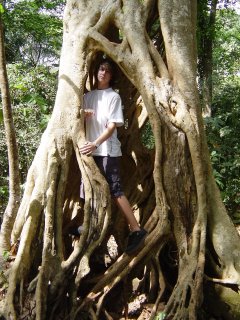
and Duke sat on the 'giraffe shaped' part of this one...
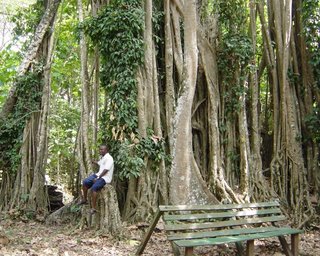
After quite a while, Jonas found us a pair of colobus monkeys. They are considerably less social and do not go into the village. These two were completely aware of our presence and totally miffed at our gawking - they actually turned away from us as we tried to peer up into their tree which was actually kind of nice to see.
Pooh on us and our free nuts- they are wild monkeys and don't need no stinkin' people. This is the best shot we could get...
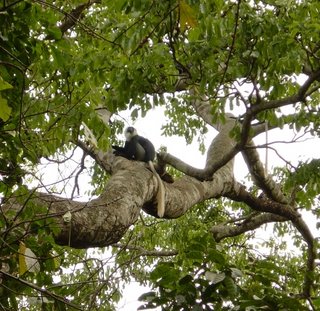
That long white tail was very impressive.
Back in the village, we had a very short wait for the monas to start their evening invasion. Coop and Duke sat outside one of the houses and eventually Coop held out his (empty) hand and after the monkey approached and saw that he had nothing batted his hand away in disgust, which of course cracked Cooper up...
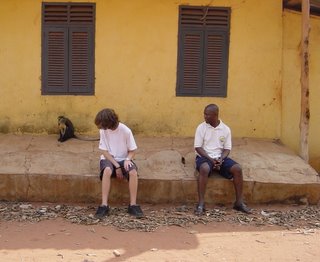
The man who lived there very kindly came out and asked if we would like to see the monkeys inside his courtyard.
So this is inside the walls, in his dooryard-
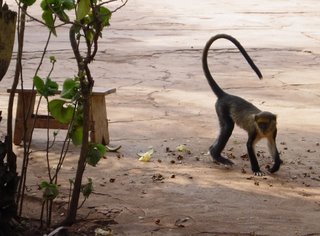
his house surrounds this area on three sides.
Jonas said each troop of monkeys visits a specific house and if one troop invades another's house there is a screeching mess until the interlopers go away.
It was a cool thing, and it's very nice to know that way out there in the center of Ghana is a small village at the edge of a big forest taking special care of two species of wild monkeys.

Next time, we head for one of only five meteor crater lakes on the planet!
Adventures in Ghana, Part I
Major road Trip! Cooper had last week off school, so we took the chance to grab Duke and go see more of the country.
Ghana does a pretty good job of building and maintaining roads, but it's a struggle nevertheless with labor being easier to provide than working paving equipment. There are countless major roadworks projects, but they all proceed very slowly and most of them won't be finished during the years we spend here.
The road from Accra to Kumasi is one of them. It's only 130 miles from here to there, but it's at least a four hour drive, and then only if everything goes smoothly. Large sections of the road are unpaved or viciously potholed so progress is sketchy. Sometimes we would be on wide new smooth sections of multi-lane highway and sometimes we would be tilting along a washboard road with axle deep potholes that kept Duke's steering skills finely tuned.
Cannibalized hulks of terrifically bad accidents are a common sight on the sides of Ghanaian roadways, but this picture of a truck on its side was a first for us.
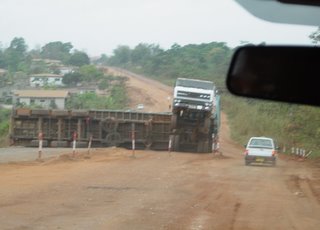
That's a semi-trailer blocking most of the road, and the cab is at right angles to the trailer, pointing at the sky.
Unbelievable.
Cooper snapped this quick shot out the windshield while the rest of us went "WHOOOOOAAAA!".
Anyway, we got to Kumasi in the early afternoon and checked into our hotel- we were hot and dusty and the hotel had a nice pool with a small waterfall, so we went swimming and Duke joined us on the pool deck.
From his lounge chair, Duke reiterated his assertion that the day I gave swimming lessons to our employees he would be calling in sick (snort). He has a major fear of water and does not wish to spend time encased in it. We continue to work on his phobia, though, being firmly convinced that knowing how to swim is a practical skill no one should be without if at all possible, and he just smiles and chuckles.
But I think he's weakening. :-)
The next morning we headed to Kumasi central and the market there. We parked the car at an apartment building near the market and walked down the hill.
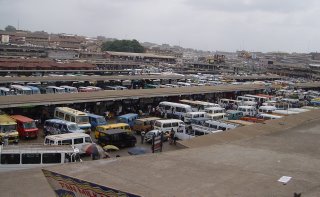
This tro-tro parking lot is a perfect slice of African reality- there are just thousands of them in all makes and colors, some of them 40 years old, none of them less than 10 years old. They move hundreds of thousands of people from place to place every single day, just in Ghana and they are found in every African country we have visited so far (six of them!).
Once we got to the market our aim was just to soak up the atmosphere, see the sights, and smell the smells.
It's an endless crush of people and things, just like Accra Central, but instead of alleys off of main streets, it's just a maze of alleys covering more than 10 acres of land. No walkway was wider than six feet, yet at one point we had to squeeze into merchandise to avoid a reversing taxi who had incredibly driven into the market to drop off a customer!
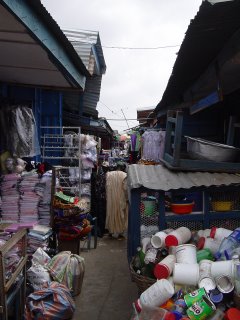
The smells alternated between tantalizing whiffs of grilled veggies and the overpowering odor of decaying fish in a section of the market dedicated to fish- fresh, dried, spoiled, you name it, they have it- and thus incredibly smelly.
This is the place you go to get whatever you need to live day to day- plastic buckets, shoes, cloth, air fresheners, diapers, underwear, batteries, fire extinguishers, whatever. If you think you need it, and they don't have it at the market- you probably don't really need it.
After wandering for an hour or so we were impossibly hot and sweaty and on sensory overload so we burst from the market onto the sidewalk of a city street and hiked back up the hill to the car.
On the way I took this picture of the Kumasi bats hanging from the trees.

Accra has the same bats, in the same stupendous numbers, but our trees have too many leaves to get a shot of them this good. All the things you see that looked like large dried leaves hanging down from the branches are actually bats. They hang there all day and then fill the skies at dusk to eat their fill of flying insects.
It's fascinating, and given the sheer numbers of them in Ghana it's a wonder there are any mosquitoes at all!
After lunch we went to the Palace of the Ashanti King (Kumasi is the "county seat" of the Ashanti Kingdom).
The Palace grounds contain new buildings that are currently being used by the King and the original Palace is a historical museum now. After paying an admission fee to the Palace (which is a two story colonial building built as an apology to the Ashanti King Prempeh for exiling him to the Seychelles) and grounds, you walk down a wide drive with lots of trees and peacocks and are picked up by the man who will be your guide for the duration.
His job is to make sure you are impressed with Ashanti history, that you understand how rich and important the Ashanti King is, and that you do not, under any circumstances, try to take a picture of the Palace.
He is serious about his job and you will just have to use your imagination and my description above to picture the building in question. Our guide was earnest, unintentionally amusing, and completely serious about the history and present of the Ashanti Kingdom- parts of which are impressive for their excess if nothing else (the King always wears the symbols of his wealth for public appearances and these take the form of six inches of gold bracelets on each arm, gold rings that even a Gabor sister would find gaudy, and enough gold chains and medallions to sink Mr. T.), and parts of which are laughably cute (for instance, the "King's Chair" in the official sitting room. A ratty black naugahyde Lazy-Boy just like ones all across America from which men rule their tiny kingdoms in suburbia...including Archie Bunker.)
Our guide was also notable as the first person since we moved here to chastise me for accepting something from him with my left hand. It's customary in most all of Africa to never use your left hand to accept an item or to eat with, however, in my experience it's overlooked almost all the time.
I have tried, while we live here, to be aware of what my left hand is doing, just as I have tried not to show the bottoms of my feet or shoes to people who are facing me (also taboo), but given that I am left-handed body and soul, and am, at best, awkward trying to do anything with my right hand, it's mostly a case of "take me as I am"- and so far everyone has, until that day in Kumasi.
When our guide abruptly told me that in his country it was considered very ill-mannered to accept something with your left hand I briefly considered telling him that in my country it was considered ill-mannered to correct a guest on their behavior. But then I remembered that I was a guest in his country and simply apologized for the lapse in etiquette. Tolerance is too often a one way street.
Inside the Palace the displays include wax figures of former Kings some of which are adorned with Ashanti gold (and protected by cameras and alarms donated by a local bank), and many examples of the former Kings' furniture and ceremonial swords.
The Palace itself made Ted and I both think of our respective Grandma's houses. It's dim and musty and has creaking wooden floors and lots of knick knacks and dark wood.
It was an interesting glimpse into the Ashanti kingdom and history, and once we were through with the tour Duke (who is of the Ashanti and who had been asking questions the whole time) began speaking with the tour guide, asking about the Golden Stool- the investiture seat for Ashanti Kings (the British had tried to confiscate it almost a hundred years ago and as a result the Ashanti have hidden it) and was told that its location was never disclosed to anyone.
Duke also queried our guide about taking pictures, and since he was Ashanti and evidently showed this man the respect he thought he was due, got permission for us to photograph the peacocks on the grounds and a large tree that the guide thought would impress us.
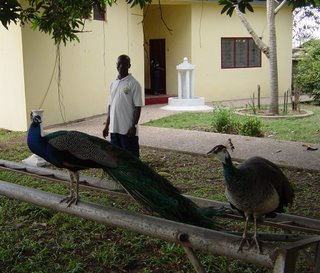
(that's Duke with a couple of the Palace peacocks...)
By this time we were overdosed on the traffic and crowds and hustle of Kumasi (please note that the driving habits of Kumasi-ans makes the drivers of Accra seem timid and polite, so if you have been following our driving adventures in Accra you will need some powerful imagination to envision just how nightmarish driving and traffic is in Kumasi...) and made plans to leave early in the morning for more rural parts of Ghana to the north.
Stay tuned!
Daddy's Home!
This is for the folks at home. A snapshot of life Chez Us.
Ted was in Nigeria last week for a couple of days. He has to go occasionally for work, and when he does I get up and take him to the airport at 6AM. Duke would happily take him, but Duke wouldn't happily kiss him goodbye and whisper sweet nothings to him, so I go instead. No sense both of us getting up at the crack o' dawn if only one of us is gonna kiss Ted goodbye. ;-)
Anyway, when Ted comes home, the timing of the flights is either just as Coop gets out of school or after 6pm. Duke would probably argue with us, but his first priority is picking Cooper up at school. We appreciate knowing that no matter what else is going on, Coop is taken care of and in Duke's safe hands. And we send Duke home to his family well before 6pm unless something very very extraordinary is going on, even though (no surprise here!) he tells us it is his job to be here whenever we need him.
But since I can easily do it, and Duke has obligations elsewhere, I am the one who picks Ted up when he returns from trips.
And here is where I demonstrate the advantages of living directly on the flight path, half a mile from the end of the runway.
About 15 minutes before his plane is due, I go sit on the porch. When a jet comes over I go out in the driveway and check to see if it's Virgin Nigeria- their planes have dark green cowlings on the wing-mounted engines (remember, the planes that go over our house are low and directly overhead- we can't see tails or fuselage paint- we have learned to identify every airline by its belly colors and/or markings).
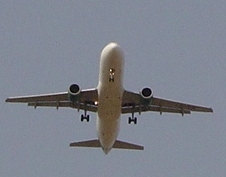
If the plane is indeed VN, I go inside, put on my shoes, grab the keys and head out to the airport. While I am driving, (we are half a mile from the runway as the jet flies, but more like 6 miles from the terminal as the people drive...) Ted is going through immigration.
Depending on the lines, and Ted's ability to speedwalk ahead of the crowd to immigration control, there is sometimes a short wait for me. To avoid the nightmare that is parking at Kotoka International Airport I wait on this little dirt patch off the back entrance to the airport property.
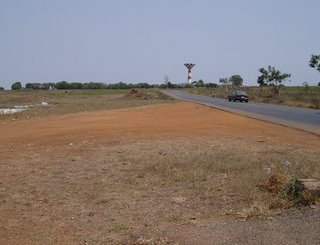
When Ted clears immigration, he gives me a call on his cell and I head up the hill to the terminal. We meet up at a bus stop right outside and I whisk him away, no muss no fuss.
I never have to call the airline to see if his flight is ontime - I always know exactly when Ted's plane arrives.
If you come visit, we will know just when your plane arrives too.




























